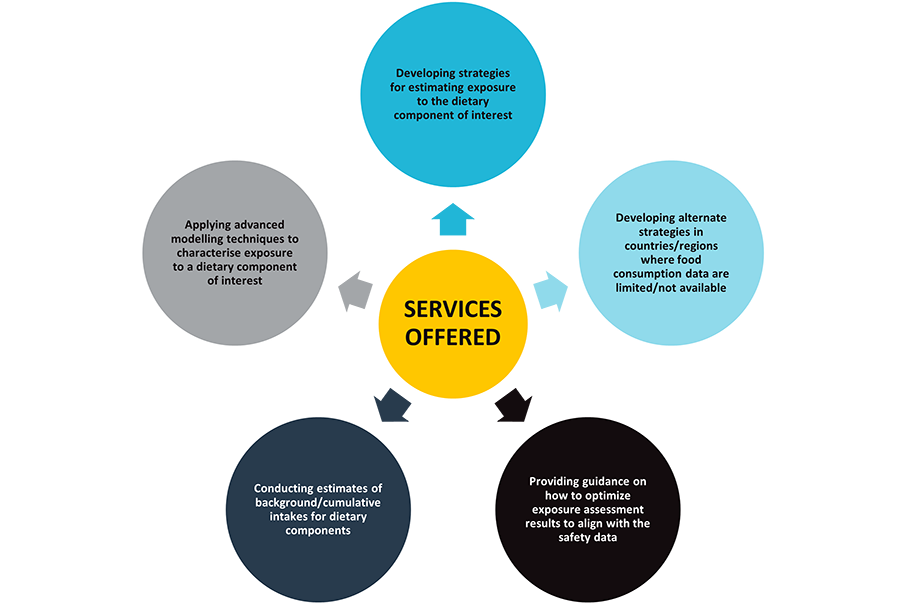Intertek’s Dietary Intake Experts conduct exposure assessments to estimate intake pattens of food additives, novel food ingredients, enzymes, and other food-related substances worldwide. The currently available food consumption databases are listed below; if the jurisdiction of interest is not listed, please contact us for alternate country/exposure assessment strategies.
Intertek supports the risk assessment process through dietary exposure assessments, which are typically required by competent authorities for food additive petitions, novel food submissions, food enzyme approvals, and Generally Recognized as Safe (GRAS) determinations. Exposure to a dietary substance may not be limited to the substance’s intended food or beverage uses; estimates may also consider existing permitted uses, natural occurrence in foods, and dietary supplement consumption.
Current food consumption databases available*:
- United States: 2017-2018 NHANES (National Health and Nutrition Examination Survey)
- European Union: EFSA (European Food Safety Authority) Comprehensive Database (most recent update: July 2021)
- France: 2014-2015 INCA 3 (Individual and National Food Consumption)
- Canada: 2015 CCHS (Canadian Community Health Survey)
- Brazil: 2017-2018 INA (National Food Survey)
- Mexico: 2018 ENSANUT (National Health and Nutrition Survey)
*Please contact us if the country/region of interest is not listed above.
Additionally, regular monitoring of intakes of dietary substances is critical to support the evaluation/development of public health guidelines by competent authorities. A number of modelling techniques can be applied to estimate exposure, as detailed in our recent publications below.
Relevant Publications:
- Full article: Low- and no-calorie sweetener intakes from beverages – an up-to-date assessment in four regions: Brazil, Canada, Mexico and the United States (tandfonline.com)
- Full article: Low- and no-calorie sweetener intakes in the Brazilian population estimated using added sugar substitution modelling (tandfonline.com)
- Nutrients | Free Full-Text | Low-/No-Calorie Sweeteners: A Review of Global Intakes (mdpi.com)
- Full article: Benzoates intakes from non-alcoholic beverages in Brazil, Canada, Mexico and the United States (tandfonline.com)
- Full article: An updated estimate of benzoate intakes from non-alcoholic beverages in Canada and the United States (tandfonline.com)
Today, gaining novel food approval in multiple markets requires a global perspective. Intertek’s Dietary Intake Experts have extensive experience conducting dietary intake assessments using various modelling methods and the most up-to-date worldwide food consumption data. Our comprehensive understanding of the food industry's regulatory requirements in multiple jurisdictions allows us to develop dietary exposure assessment strategies customized to each client’s needs.
Our dietary exposure assessments services include:
- Developing strategies for estimating exposure to the dietary component of interest, considering the most suitable methodology and using the most relevant food consumption database(s).
- Developing alternate strategies in countries/regions where food consumption data are limited/not available.
- Providing guidance on how to optimize exposure assessment results to align with safety data.
- Conducting estimates of background/cumulative intakes for dietary components (ingredients, nutrients, contaminants, etc.).
- Applying advanced modelling techniques to characterise exposure to a dietary component of interest considering different consumption scenarios.

Related Services
